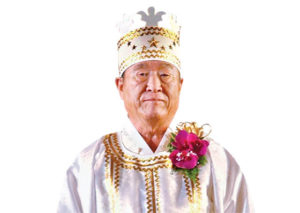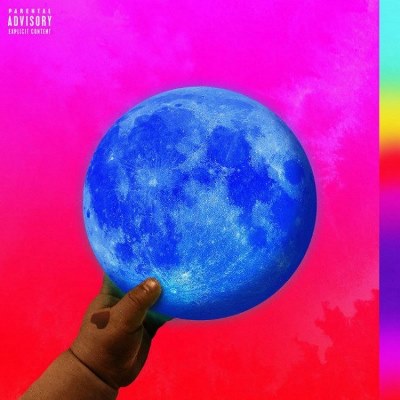Wale cuts a frustrated figure in rap at times. J. Cole read our collective minds on “False Prophets” when he spoke of a certain rapper-friend who obsesses over being considered one of the greats, so much so that he had little appreciation for where he was already. That rapper-friend is Wale.
While many viewed Cole’s harsh words as a diss, the MMG rapper took them on the chin and responded barely 24 hours after on his own song “Groundhog Day”.
I just heard a song about me on a hip-hop blog from a kid I know
Some niggas say a hip-hop God
It hit home cause there’s some truth, this I know
Cole shared a private conversation with the public but Wale’s music is so transparent anyway, you already know every detail of his maniacal chase for greatness – especially if you’re a Moon, his follower. Not to be confused with the followers of this guy.

Unification Church founder Rev. Sun-Myung Moon
Project after project, interview after interview, Wale seems to be in a constant battle to prove that he is one of the greats of his era. On his 5th album SHINE however, the D.C. native appears to take a break from his chase, catch his breath, and produce one of the most lighthearted projects from him that you’re ever going to hear.
It’s also one with the least music IQ. For instance, I don’t recall the gifted MC ever leading a project with singles as lowbrow as “My PYT” and “Running Back”. The first is a disjointed mashup of Michael Jackson’s “Pretty Young Thing” and Marvin Gaye’s “Sexual Healing”, re-skinned in hip-hop and stitched together by an irritating hook courtesy of DJ Sam Sneak – of all hook singers – while the less that’s spoken about the second song, the better.
Wale and Lil’ Wayne, both sports lovers, took turns to draw uninspiring parallels between themselves and Running Backs.
“My PYT” peaked at number 54 on the Billboard Hot 100, while “Running Back” peaked at number 1, from behind. The inability of both songs to either spark the imagination of Wale’s fan base and/or light up the charts, is part of the reason why SHINE is projected to be one of the biggest album flops of 2017.
SHINE has some typical Wale moments, like “CC White” where he intelligently linked as many objects as he lyrically could to pure cocaine – from sneakers, to cars to a woman’s love – or on “Columbia Heights” where he tried out a bit of Spanish rap or on “Rozay Scarface Gotti”, where the MC gave us all assignments on Genius to find references to all 3 southern hip-hop legends hidden in the part-tribute song. But for the most part, producing poetic, multi-layered, thought-provoking music wasn’t front and center in Wale’s mind for once – the number of chic records, trap bangers and feel-good songs on SHINE attest to that.
To my mind, it seems like 3 important connections have gotten Wale to this place of calm and contentment:
- Remaining connected to God,
- Deepening his connection to Nigeria and,
- Building a new connection with his first child Zyla Moon.
God has always has a special place in Wale’s music and he talks about Him severally on this new album. The album even opens with the soulful “Thank God”, where Wale cheekily prays that his enemies remain alive long enough to watch him succeed. The song features G-Unit R&B singer and star of the Power Rotimi – he is just one of five artists of Nigerian descent on SHINE, the others being Phil Ade, Wizkid, Davido and Olamide.
Wale’s roots in the most populous black country in the world is an outlet he is yet to fully maximize, the MMG rapper has hits Stateside but he doesn’t have a song that truly impacted Nigerian radio and clubs, in the way, say, Jidenna’s “Classic man” did. The twin records “My Love” and “Fine Girl” are his most obvious attempts to cross over yet. Wale and Wizkid have worked numerous times before, so perhaps their synergy paid off big time on the Afropop-techno worldie that is “My Love”. The rapper’s history with Davido and Olamide is, however, not as lengthy and their uninspired collaboration “Fine Girl” attests to that.
It’s as if NY-based producer Marce Reazon was asked to create a generic dancehall beat, Olamide and Davido were asked to submit leftover vocals and Wale was asked to rap as many Naija slangs as he could remember from his last time here. Too predictable. If Mr. Folarin truly wants to cross over to Nigerian clubs and radios, Nigerian producers hold the ace.
The final song on the project is “Smile” where Wale’s daughter befittingly closes proceedings with her crying voice. Wale repeatedly talks about the importance of friends and family in a cold music industry, and about Zyla Moon being the newest addition to his small circle. “Smile” also contains one of the few moments where the usually conscientious Wale touched on social issues on a project that is otherwise upbeat and optimistic.
Inevitably, the debate about just how great Wale is will continue after SHINE. I personally have no doubt that the gifted MC belongs in the same conversation as the J. Coles, the Drakes, the Big Seans and the Kendricks but while this album certainly bangs, it doesn’t present his most convincing argument to remain there.


